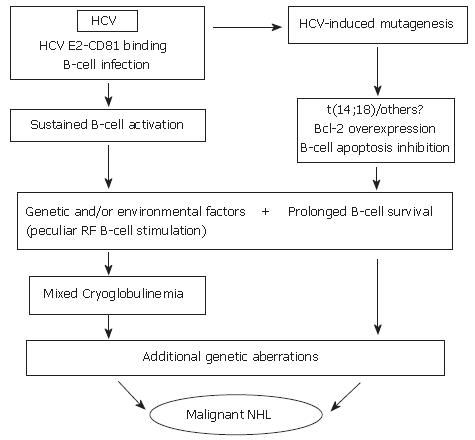Copyright
©2007 Baishideng Publishing Group Co.
World J Gastroenterol. May 7, 2007; 13(17): 2467-2478
Published online May 7, 2007. doi: 10.3748/wjg.v13.i17.2467
Published online May 7, 2007. doi: 10.3748/wjg.v13.i17.2467
Figure 1 Hypothetical interpretation of the complex relationship between chronic HCV infection, and lymphoproliferative disorders.
During chronic infection, HCV is responsible for sustained B-cell proliferation. Factors favoring polyclonal B lymphoproliferation may include the specific binding of HCV E2 protein to CD 81 (a tetraspannin which, on the B-cell surface, is part of an activating molecular complex lowering the threshold of B-cell activation by specific epitopes)[92,95], as well as the specific activation of reactive T-cells by HCV and cytokines. Favoring factors may also be represented by the persistent infection of B-cells[78,95]. Resulting sustained B-cell proliferation would in turn favor the occurrence of t(14;18) translocation and/or other errors during V(D)J rearrangement processes in germinal centers located in secondary lymphoid organs which, in case of HCV infection, would also include the liver[28]. A more direct role played by HCV lymphatic infection via viral mutagenic properties cannot be excluded[93]. Bcl-2 antiapoptotic protein overexpression in B-cells would result and lead to abnormally prolonged B-cell life. In predisposed subjects, in presence of unknown environmental, viral and/or genetic factors, HCV infection could lead to sustained production of cryoglobulins. These predisposing factors may include the peculiar susceptibility of IgM RF producing B-cells (RF B-cells) to be activated and/or the presence of particular viral variants bearing epitopes capable of selectively activating RF B-cells. It is tempting to hypothesize that the Bcl-2 rearrangement, by inhibiting B-cell apoptosis, may favor the lack of silencing higher affinity, potentially pathological RF B-cells[142], possibly leading to the development of MC syndrome. In turn, abnormal survival of B-cells would favor the acquisition of additional genetic aberrations which might ultimately lead to transformation to a frank B-cell malignancy[33].
- Citation: Zignego AL, Giannini C, Ferri C. Hepatitis C virus-related lymphoproliferative disorders: An overview. World J Gastroenterol 2007; 13(17): 2467-2478
- URL: https://www.wjgnet.com/1007-9327/full/v13/i17/2467.htm
- DOI: https://dx.doi.org/10.3748/wjg.v13.i17.2467









